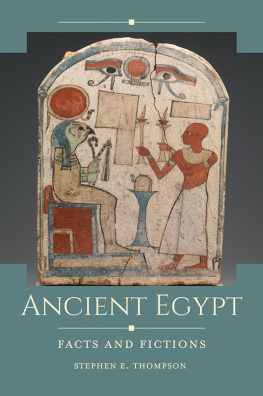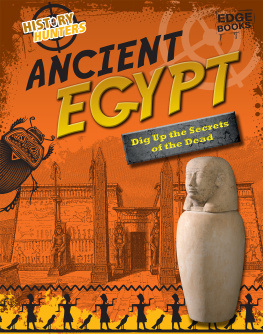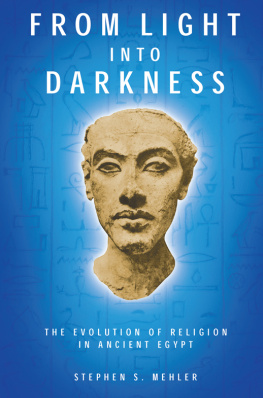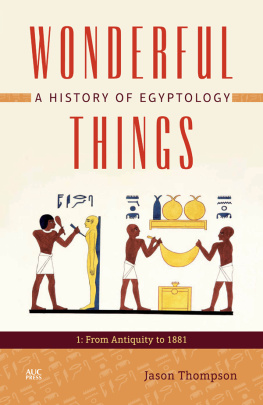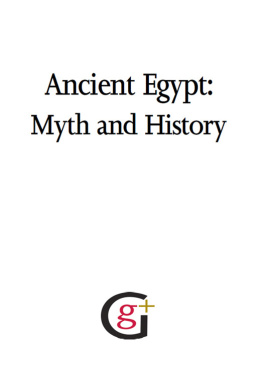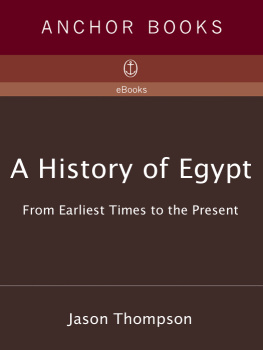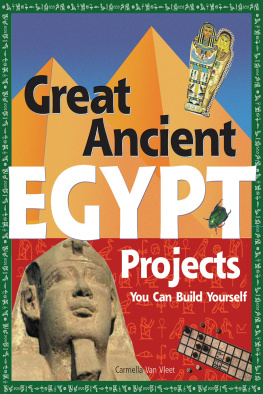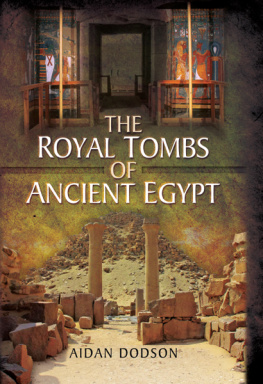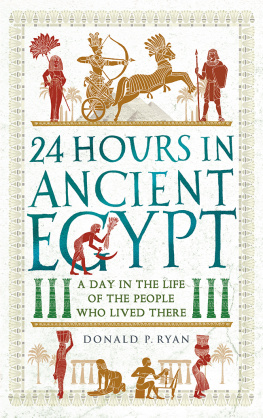Stephen E. Thompson - Ancient Egypt
Here you can read online Stephen E. Thompson - Ancient Egypt full text of the book (entire story) in english for free. Download pdf and epub, get meaning, cover and reviews about this ebook. year: 2020, publisher: ABC-CLIO, genre: Science fiction. Description of the work, (preface) as well as reviews are available. Best literature library LitArk.com created for fans of good reading and offers a wide selection of genres:
Romance novel
Science fiction
Adventure
Detective
Science
History
Home and family
Prose
Art
Politics
Computer
Non-fiction
Religion
Business
Children
Humor
Choose a favorite category and find really read worthwhile books. Enjoy immersion in the world of imagination, feel the emotions of the characters or learn something new for yourself, make an fascinating discovery.
- Book:Ancient Egypt
- Author:
- Publisher:ABC-CLIO
- Genre:
- Year:2020
- Rating:4 / 5
- Favourites:Add to favourites
- Your mark:
- 80
- 1
- 2
- 3
- 4
- 5
Ancient Egypt: summary, description and annotation
We offer to read an annotation, description, summary or preface (depends on what the author of the book "Ancient Egypt" wrote himself). If you haven't found the necessary information about the book — write in the comments, we will try to find it.
Ancient Egypt — read online for free the complete book (whole text) full work
Below is the text of the book, divided by pages. System saving the place of the last page read, allows you to conveniently read the book "Ancient Egypt" online for free, without having to search again every time where you left off. Put a bookmark, and you can go to the page where you finished reading at any time.
Font size:
Interval:
Bookmark:
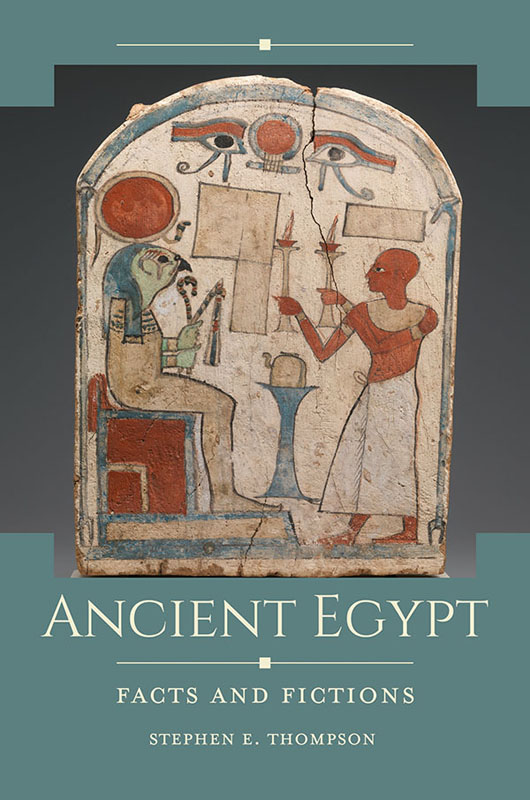
Ancient Egypt
Recent Titles in Historical Facts and Fictions
The Victorian World: Facts and Fictions
Ginger S. Frost
The Vikings: Facts and Fictions
Kirsten Wolf and Tristan Mueller-Vollmer
American Civil War: Facts and Fictions
James R. Hedtke
The Middle Ages: Facts and Fictions
Winston Black
The History of Christianity: Facts and Fictions
Dyron B. Daughrity
The History of Buddhism: Facts and Fictions
Geoffrey C. Goble
Copyright 2020 by ABC-CLIO, LLC
All rights reserved. No part of this publication may be reproduced, stored in a retrieval system, or transmitted, in any form or by any means, electronic, mechanical, photocopying, recording, or otherwise, except for the inclusion of brief quotations in a review, without prior permission in writing from the publisher.
Library of Congress Cataloging-in-Publication Data
Names: Thompson, Stephen E., author.
Title: Ancient Egypt : facts and fictions / Stephen E. Thompson.
Description: First edition. | Santa Barbara : ABC-CLIO, 2020. | Series: Historical facts and fictions | Includes bibliographical references and index.
Identifiers: LCCN 2019027447 (print) | LCCN 2019027448 (ebook) | ISBN 9781440854934 (print) | ISBN 9781440854941 (ebook)
Subjects: LCSH: EgyptCivilization. | EgyptHistoryTo 332 B.C. | EgyptCivilizationSources. | EgyptHistoryTo 332 B.CSources.
Classification: LCC DT61 .T48 2020 (print) | LCC DT61 (ebook) | DDC 932dc23
LC record available at https://lccn.loc.gov/2019027447
LC ebook record available at https://lccn.loc.gov/2019027448
ISBN: 978-1-4408-5493-4 (print)
978-1-4408-5494-1 (ebook)
242322212012345
This book is also available as an eBook.
ABC-CLIO
An Imprint of ABC-CLIO, LLC
ABC-CLIO, LLC
147 Castilian Drive
Santa Barbara, California 93117
www.abc-clio.com
This book is printed on acid-free paper 
Manufactured in the United States of America
Every reasonable effort has been made to trace the owners of copyright materials in this book, but in some instances this has proven impossible. The editors and publishers will be glad to receive information leading to more complete acknowledgments in subsequent printings of the book and in the meantime extend their apologies for any omissions.
For my children, Rachel and Jacob, and for
my grandchildren, present and future.
Contents
Ancient Egyptits monuments, artifacts, language, and religionhave long been a source of fascination to many. In fact, there is a special term, Egyptomania, to describe the avid curiosity, bordering on obsession, that many have experienced with regard to ancient Egypt. Over the hundreds of years during which scholars have been writing about Egypt, numerous misconceptions and errors have crept into common perceptions of ancient Egypt. Popular culture, through short stories, novels, and movies, has also contributed to the spread of such misconceptions. In the pages that follow, eight popular misconceptions about ancient Egypt (here labeled fictions) will be examined through primary sources. Each chapter begins with a brief statement of the erroneous belief held by many (what people believe happened) and a discussion of how that false belief became widespread (how the story became popular). After this account is a selection of primary sources illustrating the erroneous belief. This is then followed by an explanation of the correct understanding (what really happened) and a selection of primary sources, mostly translated from the Egyptian language in its various forms, supporting this corrected view.
Many of the translations of the Egyptian sources are my own, and I readily acknowledge my debt to previous translators of the various passages under discussion. Whenever possible, I have included references to these previous translations in the selections for further reading at the end of each chapter. The Thesaurus Linguae Aegyptiae (http://aaew2.bbaw.de/tla/index.html) has also served as an incredibly useful tool when translating Egyptian texts. The dates given for the lengths of the reigns of the Egyptian kings are taken from Hornung, Krauss, and Warburton (2006, 490495).
Further Reading
Hornung, E., R. Krauss, and D. A. Warburton, eds. 2006. Ancient Egyptian Chronology. Leiden: E. J. Brill.
I would like to thank George Butler for the invitation to write this book and Robin Tutt for guiding me through the process. This book would not have been possible without the assistance of Tanya Lopez, Dorothea McComisky, and the staff of the Interlibrary Loan Department at the Alvin Sherman Library at Nova Southeastern University. The staff of the Rockefeller Library at Brown University were also very helpful during my brief visit there in the summer of 2017.
One asked how we Egyptians worship our native gods, another why certain animals are deified in one place and others in another and what stories were told of each. One inquired about the construction of the pyramids, another about the cause of the subterranean galleries. In a word, there was nothing Egyptian into which they did not inquire, for anything heard or told of Egypt has a special charm for Greek listeners.
Heliodorus, Aethiopica (Smelik and Hemelrijk 1984, p. 1997)
This passage comes from a novel written in the third or fourth century CE and reflects the Greek obsession with all things Egyptian. The speaker is an Egyptian, a priest of Isis in her temple at Memphis, who was visiting the oracle of Apollo at the city of Delphi in Greece. While there, he found himself interrogated by Greeks hungry for information regarding Egyptian religion and culture. Once Greeks began to visit Egypt in large numbers, they developed a fascination with Egyptits antiquity, its monuments, and its foreign customs and religious practices. Beginning with Herodotus, the father of history, some Greek visitors to Egypt wrote about their visits, describing what they witnessed and what native informants told them. In addition to Herodotus, important among such authors are Hecataeus, Diodorus Siculus, Strabo, and Plutarch. The Greeks expressed considerable admiration for Egyptian society and developed a tradition that all the great Greek statesmen, philosophers, and mathematicians had studied in Egypt at some point in their lives.
In 332 BCE, Alexander the Great conquered Egypt, and after his death, one of his generals, Ptolemy, took control of Egypt, inaugurating the Ptolemaic Dynasty, which lasted until 30 BCE. The most famous member of this dynasty was Cleopatra the Great, and her role in the civil war between Octavian and Mark Antony led to the creation of Roman propaganda unfavorable to both Cleopatra and Egypt (even though Cleopatra was Greek, not Egyptian). The Roman attitude toward Egyptian religious practices is far more negative and ridiculing than that of the Greeks. With the coming of Christianity to both the Roman Empire and Egypt, traditional Egyptian religious practice came in for more abuse as a pagan religion. One result of the Christianization of Egypt to have far-reaching consequences for the Western acquaintance with ancient Egypt was the closure of the temples to the Egyptian gods by the Roman Emperor Theodosius in 383 CE. By this time, the native Egyptian language, written in several different scripts, was used by a small number of priests employed by the temples. The closure of the temples resulted in the loss of the ability to read the traditional Egyptian scripts.
Font size:
Interval:
Bookmark:
Similar books «Ancient Egypt»
Look at similar books to Ancient Egypt. We have selected literature similar in name and meaning in the hope of providing readers with more options to find new, interesting, not yet read works.
Discussion, reviews of the book Ancient Egypt and just readers' own opinions. Leave your comments, write what you think about the work, its meaning or the main characters. Specify what exactly you liked and what you didn't like, and why you think so.

